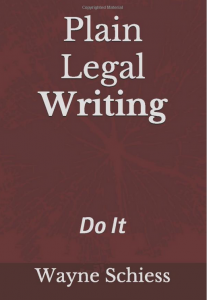It’s not wrong. It’s less formal.
“There is no rule against ending sentences with prepositions.” Texas Law Review, Manual on Usage & Style 55 (13th ed. 2015).
Is that authoritative? After all, the MoUS is written by students. Yet Bryan Garner agrees: the “rule” against ending a sentence with a preposition is “a superstition that just won’t die.” The Redbook 195 (4th ed. 2013). Strunk and White say so, too: “Not only is the preposition acceptable at the end, sometimes it is more effective in that spot than anywhere else.” The Elements of Style 77-78 (4th ed. 2000). Yes, that’s the fourth edition from 2000, but the quoted language is unchanged from the first edition in 1959 (see page 64).
Canvass the style manuals and writing references and websites—the answer is near universal. End a sentence with a preposition if you need to. Prepositions are perfectly good words to end sentences with. If you think there’s a rule against ending with a preposition, you don’t know what you’re talking about.
So what’s the deal?
First, a preliminary matter. This blog is about writing, not speech, but ending with a preposition is fine in conversation, right? That’s something I hope we can agree on. In particular, we often end with prepositions when asking questions: Who are you talking about? Where did he disappear to? What did you step on? Most of us would never speak these stiff, over-formal versions: About whom are you talking? To where did he disappear? On what did you step?
Back to writing. Despite the experts (the MoUS, Garner, Strunk & White) the supposed rule against ending propositions still causes lawyers to write sentences like this:
- Attached are three local rules of which you should be aware.
- A hammer, not an ax, was the weapon with which he struck the victim.
- The deponent could not recall in which folder she saved the file.
These sentences are grammatically correct and have no ending prepositions, but to me they’re stilted and unnatural. They don’t flow.
One reason for these stilted sentences is that we know other legal writers believe the supposed rule, and we don’t want to risk annoying those readers or, worse, seeming semi-literate. And so the circle spins on. We know it’s okay to end with a preposition, but we also know some of our readers don’t know it’s okay, so we avoid doing it, perpetuating the no-ending-preposition practice.
What should we do? Rather than treat ending prepositions as wrong or right, a better approach is to think of them as a matter of formality and emphasis.
Ending with a preposition isn’t wrong. It’s less formal. That realization alone leads to some easy decisions. Appellate brief? A highly formal document for an audience whose grammar preferences you probably don’t know well. Avoid ending with prepositions. Memo to a supervisor? A moderately formal document for an audience whose preferences you might know. Unless the audience objects, an occasional ending preposition is acceptable. Work-related email to a colleague? An informal document to a well-known audience. Ending with prepositions is fine.
Ending with a preposition is also a matter of emphasis. You always have options, so you can always avoid ending with a preposition, but knowing when to do it requires experience and what we often call “a good ear.” Here’s an example.
Suppose you want to convey this idea:
- Silver Partners refused to join any venture Hooper was part of.
That sentence strikes me as succinct and forceful. But you have several options that don’t end with a preposition.
- Silver Partners refused to join any venture if Hooper was part of it.
Or this:
- If Hooper was part of the venture, Silver Partners refused to join.
But don’t choose this option:
- Silver Partners refused to join any venture of which Hooper was part.
It’s always possible to avoid ending with a preposition, and avoiding has no risk. But I offer these two points.
(1) Don’t write the stilted, ending-preposition work-arounds like that last example (of which Hooper was part); they sound unnatural and affected.
(2) If the preposition-ending sentence creates just the tone and emphasis you want, do it.
After all, there is no rule against ending a sentence with preposition.
Get the books:


